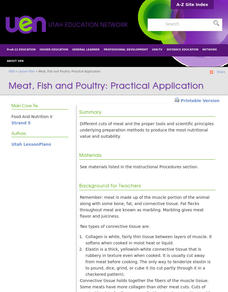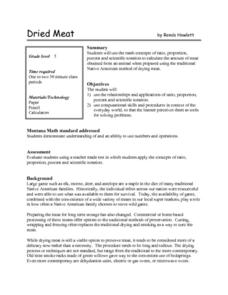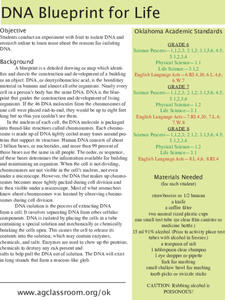Curated OER
Meat, Fish and Poultry: Practical Application
A note-taking outline is given to learners which covers meat composition and quality, types of meat and storage, and cooking meat. By viewing pictures they learn to identify cuts of meat or poultry products. They discuss inspection and...
Curated OER
Meat Test
Students explore basics of meat, meat cookery, and preparation skills and techniques in safe handling procedure. Students state qualities or advantages of casserole, identify parts of casserole, food ingredients, function of...
Curated OER
Dried Meat
Students investigate the traditional method of drying meat used by Native Americans. They apply math concepts such as ratio, proportion, percent, and scientific notation to determine the amount of meat the is dried from an animal using...
Curated OER
King Henry's Meat Group
Second graders hear a story about King Henry the Egg, Little D and the meat group. They act out the parts as the story is read aloud and complete a worksheet. They pantomime activities that use and build muscle
Curated OER
Where's the Beef - Beef Facts or Hype, Is it Bad for You?
Analyze a Happy Meal™ for nutrient content and calories. Blend the contents into "McMush" and use Biuret's solution to test for protein content. There are a few problems with the lesson plan: the resource links are no longer...
Curated OER
Cut and Paste Food Chain
Young scholars study life science. For this food chain lesson, students discover the different types of animals that make up an ecosystem. They discuss as a class and then work independently on a food chain activity. This lesson includes...
Desert Discoveries
What's For Dinner?
Youngsters compare the teeth of plant-eating dinosaurs with those of meat-eating dinosaurs. The concepts of herbivore vs. carnivore are also introduced. There is an excellent worksheet embedded in the plan which shows five skulls of...
Curated OER
A Lucky Break
Explore idioms with a chicken theme! Consider doing these activities prior to Thanksgiving, as there's a section about wishbones! First your youngsters will match a short list of idioms with their meanings. Then, give each learner the...
Lesson This!
Fraction Fruit
Discover the concept of fractions by using fruit as a model. Scholars discover fractions are part of a whole, similar to the pieces of fruit which are placed in front of them. They then cut up several different types of fruit and discuss...
Curated OER
About Chickens
Here's a cute and informative four-page packet of worksheets about chickens for your young agriculturists. They get to write words that have to do with chickens, perform cut-and-paste activities, and discover some fun facts about...
Curated OER
Food Pyramid
Students construct food pyramids by painting shoe boxes and using them to respresent different food groups. They cut out and paste pictures of the respresentative foods for the groups on the box sides. They compare their diets to the...
Curated OER
The Magic School Bus Gets Eaten
Students learn along with Ms. Frizzle's class. In this Magic School Bus lesson plan, students eat while they act as links in the food chain. Popcorn bags stand for food energy that is passed along the links in a food chain from the sun,...
Curated OER
Who Eats Who?
Young scholars recognize that some animals eat plants, some eat meat and some both. For this who eats who lesson, students chart animals in a food chain. Young scholars research information from reading articles. ...
Curated OER
"Wet" Your Appetite: Conserving Water
Students investigate how water is utilized in producing food. In this agriculture lesson plan, students examine how much water goes into the creation of their daily menu. Students create a new menu that can conserve water and cut their...
Curated OER
Teeth and Eating
Students examine pictures of different animals and decide if they eat meat and/or plants. They inspect models of pairs of upper and lower teeth and discuss which teeth are most useful for cutting grass and tearing meat.
Curated OER
DNA Blueprint for Life
Did you know that meat tenderizers contain DNA cutting enzimes? Did you know that you can isolate your own DNA? Or the DNA of fruit? Explore with your learners the DNA world with a series of experiments using readily available materials...
Curated OER
WHERE'S THE BEEF?
The student will become visually aware of the different shapes of wholesale cuts of beef.1. Ask a local meat cutter to make a class visit to explain his or her job. 2. Enlarge the steer outline on Student Worksheet B, and place it on a...
Curated OER
Spongy Wetlands
Students sort things that absorb and things that do not absorb, They predict, orally or in writing, what happens to houses with or without wetlands. Students build a wetland area in a meat tray to show how wetlands absorb water, and they...
Curated OER
Meet the Royal Food Family
Second graders use mini-books, posters, songs, trading cards and sorting activities to explore the five food groups needed for health: vegetables, fruits, grains, milk and meat. They discuss why good nutrition is important.
Project SMART
Dinosaur Trek
Second graders investigate dinosaurs. They explore various websites, submit questions to a paleontologist online, construct cut and paste model dinosaur skeletons, develop a graph to compare dinosaurs, and label pictures from online...
Curated OER
Food in Our Lives
Students examine the food pyramid. In this healthy eating lesson, students discover the parts of the food pyramid and how much to eat from each section. They cut out pictures to glue on their food pyramid.
Curated OER
Flying Wing
Students cut out and trace a Flying Wing pattern on the bottom of the foam tray. They test flight it and observe the flight of the wing.
Curated OER
The Cloning of Plasmid and Spinach DNA
Students will first extract genomic DNA from spinach and perform a restriction enzyme digestion on both the spinach DNA and the plasmid using the same restriction enzyme. They then ligate the cut plasmid DNA with the cut spinach DNA in...
Curated OER
Four-Wing Paper Boomerang
Students cut out the pattern of the Four-Wing Boomerang and trace it on to one half of the file folder. They practice throwing it.

























